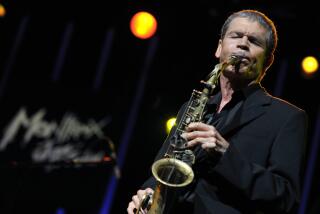Hooks Calls Claim of Bias ‘Unfortunate’ : NAACP Leader Stops Short of Public Apology to Five Black Singers
The head of the National Assn. for the Advancement of Colored People said Monday that it is “unfortunate” that a local NAACP official accused five black singing stars of discriminating against other blacks in the recording industry.
But Benjamin L. Hooks, executive director of the NAACP, stopped short of a public apology for the remarks made earlier this month by Melanie Lomax, a regional coordinator for the organization in Southern California.
Hooks said at a Los Angeles news conference that he does not know whether there is any accuracy to Lomax’s contentions that Tina Turner, Michael Jackson, Lionel Richie, Diana Ross, Prince and their record companies are practicing “hypocritical discrimination” against black promoters, technicians and other professionals.
The NAACP leader said he has appointed a six-member task force to look into the allegations against the five and the recording industry as a whole.
Spokesmen for Turner, Jackson, Richie, Ross and Prince have denied any racial discrimination.
In a prepared statement he read Monday, Hooks’ only reference to the accusations against the singing stars was contained in a single paragraph, which read:
“The reported targeting of the five individual entertainers was unfortunate, in that the NAACP and other civil rights organizations have enjoyed a long history of contributions of time and financial support from a large number of members of the entertainment and recording industry.”
Copies Mailed to Singers
Hooks said copies of the statement had been mailed to the five. Asked if this was intended as an apology, Hooks replied, “The statement speaks for itself.”
He added, however, that Lomax’s decision to criticize the stars publicly--in an interview with The Times published on July 3--before talking to them privately and seeking an agreement that would resolve any problems “was not in keeping with NAACP policies.”
He said that he talked with Lomax about the matter on Sunday and that they “came to an agreement” that there would be no repetition of her “unfortunate accident.” Hooks said he had not scolded Lomax for her actions.
Lomax said later Monday, however, that Hooks had “reprimanded” her during their meeting, explaining to her that “proper NAACP procedure had not been followed . . . .”
“I don’t feel contrite,” she said. “I have no apology. I have received hundreds of telephone calls from people who support me. . . .
“The national office will be looking into the facts,” Lomax said. “I’m fully prepared to apologize if the substance of the allegations turns out to be incorrect.”
Lomax said her accusations were based, in large part, on the experiences of about 40 black professionals who formed a coalition earlier this year called Black Business for Equity in Entertainment.
These professionals, most of whom joined the recording industry in the 1960s and ‘70s, said their job opportunities are shrinking rather than expanding apace with the rising revenues from black recording artists.
The coalition said the problem was evident during the USA for Africa project, in which 45 pop music stars donated their talents to record the hit single, “We Are the World,” written by Jackson and Richie.
Although many of the faces in the hit video that accompanied the song were black, none of the faces behind the cameras was black, according to the coalition.
Myra Lebo, a deputy director of the project, denied that there was any attempt to exclude blacks.
“What happens is something peculiar almost to the entertainment industry,” said Lebo, who is black. “You want everything to be right, and you turn to the people you know,” she said. “If you know whites, you bring in whites.”
More to Read
The biggest entertainment stories
Get our big stories about Hollywood, film, television, music, arts, culture and more right in your inbox as soon as they publish.
You may occasionally receive promotional content from the Los Angeles Times.






